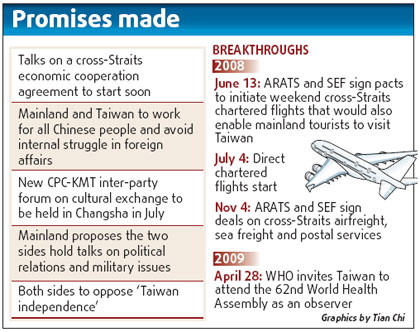
|
CHINA> National
 |
|
Hu powers cross-Straits talks
By Wu Jiao and Xie Yu (China Daily)
Updated: 2009-05-27 07:27 Hu Jintao, general secretary of the Communist Party of China (CPC) Central Committee, met with Wu Poh-hsiung, Taiwan Kuomintang (KMT) chairman, Tuesday and the two promised to start talks on a cross-Straits economic cooperation pact soon and avoid "internal struggle" in foreign affairs. Hu and Wu agreed to implement the common agenda for peaceful cross-Straits development, agreed by leaders of the two parties in 2005, said a statement issued after their meeting.
The two sides will continue opposing "Taiwan independence", sticking to the 1992 Consensus, and "work to strengthen mutual trust". The mainland expects talks on a cross-Straits economic cooperation pact to start in the later half of this year, Hu said, and "the two sides should push forward the preparation work for signing the agreement". In the meantime, they hope to promote exchanges between cultural and educational sectors. "The two sides said they should avoid internal struggle in foreign affairs and work for the interest of all Chinese," the statement said.
"It indicates Chinese on both sides of the Taiwan Straits have the ability and wisdom to properly solve issues concerning the island's participation in the activities of international institutions," he said. Cooperation talks The mainland will continue to focus on economic cooperation, and its top priority would be how to jointly deal with the global economic crisis, Hu said. The mainland prefers an agreement that would benefit economic development on both sides, improve public welfare and contribute to building a cooperative mechanism that fits the cross-Straits reality. Hu's remarks are the latest signal from the mainland on the setting up of a cross-Straits economic cooperative mechanism, which Taiwan has been hoping for to check the slump in its economy.
The CPC-KMT forum held since 2006 is a successful platform, Hu said, and it should be continued and improved. Wu said a new CPC-KMT inter-party forum, focusing on cultural exchange would be held in Changsha, capital of Hunan province, in July. "We have adopted some measures," Hu said, "to pull through this crisis together with you [Taiwan people] because compatriots on both sides of the Taiwan Straits belong to one family We will continue doing this if the situation requires us to." The mainland proposed the two sides hold pragmatic talks on political relations and the setting up of a mutual-trust mechanism on cross-Straits military security since the country is not yet reunified. Mutual trust based on opposing "Taiwan independence" and sticking to the 1992 Consensus since last May have helped solve a series of complicated cross-Straits problems, Hu said. Inter-party exchanges and talks, especially at high levels, will continue playing the most important role in maintaining the development momentum in cross-Straits ties, he said.
 Hu's promises and remarks push forward the process of an economic cooperation agreement, said Zhang Guanhua, an expert of the Chinese Academy of Social Sciences. "It provides a general time table for such an agreement, too." A cooperation agreement will help develop even closer economic ties between the two sides, Zhang said. After a deal is signed Taiwan-made products could be exempt from import tariff on the mainland, the experts said. This, coupled with the sharp reduction in time and shipping costs after the three direct cross-Straits links are established, will sharply boost the export competitiveness of Taiwan-made products. But Taiwan's pro-independence opposition Democratic Progressive Party has opposed a comprehensive economic pact. It claims that that would make the cross-Straits market virtually a "one China market" and demote Taiwan to the status of a local government in any rapprochement talks. |